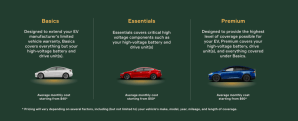Owners of aging EVs aren’t exactly flush with options if something breaks after the original warranty expires. One Bay Area startup called Amber thinks it can help them navigate that minefield, starting with Tesla owners.
The company, founded in early 2023, announced Wednesday it has launched a new aftermarket warranty product called AmberCare for Model Y, 3, S and X owners. There will be different plans, ranging from $ 40 per month to around $ 120 per month, that cover the drive units, the battery and more. When owners file a claim, Amber works with qualified repair shops to find the right parts and fix what’s wrong, and will transport the vehicle.
The launch of AmberCare is a reminder that we’re still in uncharted territory when it comes to EVs, and what happens to them over years (and tens of thousands of miles) of use.
It’s a fraught market. While EVs tend to require less regular service than internal combustion vehicles, things still break — and sometimes what breaks are parts that are above and beyond what an auto shop is used to dealing with. Some shops charge eye-watering prices for the fixes or say damaged EVs should be scrapped outright. Existing extended warranty products sometimes don’t cover EV-specific parts. And if people own more limited-run EVs (compliance cars or luxury vehicles from relatively new startups, for instance) the problem can be even harder to solve.
Amber CEO Joe Pak tells TechCrunch that AmberCare is an attempt to address all of this. “Our vision is to build the first vertically integrated aftermarket warranty platform,” he says, because right now “the capacity to actually service [EVs], and the parts to actually replace what might be broken — that is not mature yet.”

Image Credits: Amber
To do that, Amber has been working with repair shops around the country, and identifying and helping source high-demand parts. To achieve its lofty goals, Amber will put $ 3.18 million in newly-announced seed funding to work, from a round led co-led by Era and Prime Sazze, with Alcove Fund, Virta Ventures, Global Millennial Capital and Root & Shoot Ventures joining. The company is launching AmberCare in 10 states: Florida, Connecticut, New Jersey, New Hampshire, Michigan, Minnesota, Pennsylvania, Ohio, Rhode Island, and Tennessee.
AmberCare is the latest addition to a growing economy built around used EVs. A new crop of businesses have popped up that are dedicated to efforts like recycling the battery packs that power the cars — including Redwood Materials, founded by ex-Tesla CTO JB Straubel — or tending to the “digital maintenance” of EVs and AVs, like Lux Capital-backed Kinetic.
Pak says he sees two customer groups for AmberCare, at least at the outset. One group is anyone who is looking to buy a used EV but is scared away by the thought of expensive, time-consuming repairs. For them, “we give them the idea that they can cap their repair costs” with AmberCare, he says. The second is the set of owners who hold onto their EVs past Tesla’s warranty.
Amber only has a team of five people at the moment, but that they already have a small group of customers using an early access version of AmberCare. With the product launched, he says he thinks the best way to acquire new customers will be interacting with the EV community — especially on online forums, where die-hards tend to spend a lot of time discussing the ins and outs of EV ownership, including kvetching about the occasional trouble of major repairs.
There are other unexpected things to consider in the process of repairing an EV that Pak thinks AmberCare can help with, like transportation. “Not every tow truck can tow an EV, it has to be a flatbed,” he says.
Pak also says he’s aware of the challenge of building a business around extended warranties at a time when people are pretty allergic to that phrase, thanks to years of phone scams. So far, though, “customers actually get it.”
“You can even say the words ‘extended warranty,’ and they’ll get it. And in fact, it’s actually better for us just to just to say it upfront that way,” he says.
Besides, “there are people are shipping their cars from Ohio to San Diego to get [their EVs] fixed,” Pak says. “There’s a gap in the market for this solution already.”







